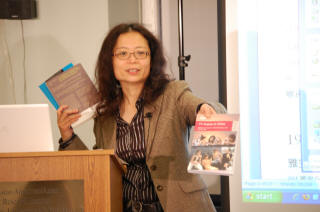
This presentation is on Prof. Ying Zhu’s documentary about the pioneering Chinese educational filmmaker Sun Mingjing. Sun’s documentaries marked a pinnacle of China’s non-fiction film production in the 1930-40s yet, up until the early 2000s, his name was scarcely mentioned in film history books in China and his films were mostly unknown to the generation of filmmakers growing up during the PRC era. The historical snub has to do with Sun’s Christian Universities affiliated and Nationalist government funded film practice. Sun made all his films during his tenure at the Jingling University (now the University of Nanjing), one of the thirteen Chinese Christian Universities founded by the United Board for Christian Higher Education.
During his Jingling era, Sun was in charge of making one hundred nineteen films on topics ranging from travelogues to science, education, industry, agriculture, public affairs, ethnic and folk culture, and religious activities. His camera captured rare footage of Japan’s Chongqing atrocity, local village elections, Tibetan’s Buddhist rituals, etc. His films bore witnesses to the evolving political, economic, social, and cultural landscapes of China in the 1930-40s.

More than half of Sun’s films were archived at the Department of Education under the Nationalist Government. The archived films were screened widely across China at the time. Among his oeuvre were China’s first color film “Solar Eclipse” (1936) and the first sound film in color, “The Frontline of Democracy” (1947).
Sun joined Beijing Film Academy in 1952, bringing along the Film Department he founded at Jingling University. Sun’s career was short-circuited soon afterwards. He was labeled a “rightist” during the Anti-Rightist Campaign (1967-58) and endured a prolonged hardship during the subsequent Cultural Revolution. He passed away quietly in 1992.

Prof. Zhu’s documentary traces Sun’s film practice from his youthful fascination with camera through the heydays of his career until the abrupt end of a brilliant film practice. Sun’s personal journey is intertwined with the journey of China throughout its volatile political era. The film further features a few prominent historical figures associated with Sun during the era, including the American missionary Minnie Vautrin, who risked her life protecting local Chinese women from Japanese soldiers during the rape of Nanjing.
The film juxtaposes raw footages of Sun’s films with interviews of his colleagues and students, many of them known cultural figures in contemporary China.

Prof. Zhu’s film further spotlights Sun’s US connections. Sun was remarkably knowledgeable about US documentary film practice. Sun spent a year in the US from June 1940 to 41, watching and studying documentary films in New York. He was instrumental in translating ninety-nine US educational documentary films into Chinese. Sun formed close relationships with a few key players in the US film industry during his stay in the states. Studios including Walt Disney presented him free prints of old classics. The old films proved invaluable to China’s film education. Sun’s American connection was extended during WWII when Sun prompted the US army crash courses on cinematography two years. To thank Sun for his contribution to the War effort, Vice President Henry Wallace visited Jinling University at Chengdu in June 1944, donating 14 US educational films to Sun’s Department. All of these are touched upon in my documentary.

